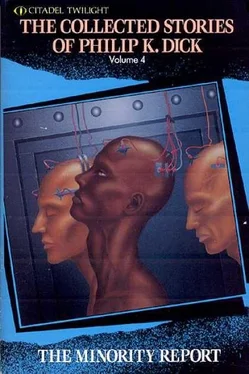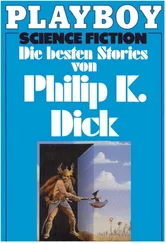At once the audience became alert; people leaned forward to see, some of them chuckling with delight.
"Look," a man said excitedly. It was old Joe Purd, as eager as a child. "It's the papoola!"
A woman rose to her feet to see more clearly, and Ian thought to himself, Everyone loves the papoola. We'll win, whether we can play the jug or not. And then what? Will meeting Nicole make us even more unhappy than we are? Is that what we'll get out of this: hopeless, massive discontent? An ache, a longing which can never be satisfied in this world?
It was too late to back out, now. The doors of the auditorium had shut and Don Klugman was rising from his chair, rapping for order. "Okay, folks," he said into his lapel microphone. "We're going to have a little display of some talent, right now, for everyone's enjoyment. As you see on your programs, first in order is a fine group, the Duncan Brothers and their Classical Jugs with a medley of Bach and Handel tunes that ought to set your feet tapping." He beamed archly at Ian and Al, as if saying, How does that suit you as an intro?
Al paid no attention; he manipulated his controls and gazed thoughtfully at the audience, then at last picked up his jug, glanced at Ian and then tapped his foot. "The Little Fugue in G Minor" opened their medley, and Al began to blow on the jug, sending forth the lively theme.
Bum, bum, bum. Bum-bum bum-bum bum bum de bum. DE bum, DE bum, de de-de bum… His cheeks puffed out red and swollen as he blew.
The papoola wandered across the stage, then lowered itself, by a series of gangly, foolish motions, into the first row of the audience. It had begun to go to work.
The news posted on the communal bulletin board outside the cafeteria of the Abraham Lincoln that the Duncan Brothers had been chosen by the talent scout to perform at the White House astounded Edgar Stone. He read the announcement again and again, wondering how the little nervous, cringing man had managed to do it.
There's been cheating, Stone said to himself. Just as I passed him on his political tests… he's got somebody else to falsify a few results for him along the talent line: He himself had heard the jugs; he had been present at that program, and the Duncan Brothers, Classical Jugs, were simply not that good. They were good, admittedly… but intuitively he knew that more was involved.
Deep inside him he felt anger, a resentment that he had falsified Duncan's test-score. I put him on the road to success, Stone realized; I saved him. And now he's on his way to the White House.
No wonder Duncan did so poorly on his political test, Stone said to himself. He was busy practicing on his jug; he has no time for the commonplace realities which the rest of us have to cope with. It must be great to be an artist, Stone thought with bitterness. You're exempt from all the rules, you can do as you like.
He sure made a fool out of me, Stone realized.
Striding down the second floor hall, Stone arrived at the office of the building sky pilot; he rang the bell and the door opened, showing him the sight of the sky pilot deep in work at his desk, his face wrinkled with fatigue. "Urn, father," Stone said, "I'd like to confess. Can you spare a few minutes? It's very urgently on my mind, my sins I mean."
Rubbing his forehead, Patrick Doyle nodded. "Jeez," he murmured. "It either rains or it pours; I've had ten residents in today so far, using the confessionator. Go ahead." He pointed to the alcove which opened onto his office. "Sit down and plug yourself in. I'll be listening while I fill out these 4-10 forms from Boise."
Filled with wrathful indignation, his hands trembling, Edgar Stone attached the electrodes of the confessionator to the correct spots of his scalp, and then, picking up the microphone, began to confess. The tape-drums of the machine turned as he spoke. "Moved by a false pity," he said, "I infracted a rule of the building. But mainly I am concerned not with the act itself but with the motives behind it; the act merely is the outgrowth of a false attitude toward my fellow residents. This person, my neighbor Mr. Duncan, did poorly in his recent relpol test and I foresaw him being evicted from Abraham Lincoln. I identified with him because subconsciously I regard myself as a failure, both as a resident of this building and as a man, so I falsified his score to indicate that he had passed. Obviously, a new relpol test will have to be given to Mr. Duncan and the one which I scored will have to be voided." He eyed the sky pilot, but there was no reaction.
That will take care of Ian Duncan and his Classical Jug, Stone said to himself.
By now the confessionator had analyzed his confession; it popped a card out, and Doyle rose to his feet wearily to receive it. After a careful study he glanced up. "Mr. Stone," he said, "the view expressed here is that your confession is no confession. What do you really have on your mind? Go back and begin all over; you haven't probed down deeply enough and brought up the genuine material. And I suggest you start out by confessing that you misconfessed consciously and deliberately."
"No such thing," Stone said, but his voice – even to him – sounded feeble. "Perhaps I could discuss this with you informally. I did falsify Ian Duncan's test score. Now, maybe my motives for doing it -"
Doyle interrupted, "Aren't you jealous of Duncan now? What with his success with the jug, White House-ward?"
There was silence.
"This could be," Stone admitted at last. "But it doesn't change the fact that by all rights Ian Duncan shouldn't be living here; he should be evicted, my motives notwithstanding. Look it up in the Communal Apartment-building Code. I know there's a section covering a situation like this."
"But you can't get out of here," the sky pilot said, "without confessing; you have to satisfy the machine. You're attempting to force eviction of a neighbor to fulfill your own emotional needs. Confess that, and then perhaps we can discuss the code ruling as it pertains to Duncan."
Stone groaned and once more attached the electrodes to his scalp. "All right," he grated. "I hate Ian Duncan because he's artistically gifted and I'm not. I'm willing to be examined by a twelve-resident jury of my neighbors to see what the penalty for my sin is – but I insist that Duncan be given another relpol test! I won't give up on this; he has no right to be living here among us. It's morally and legally wrong!"
"At least you're being honest, now," Doyle said.
"Actually," Stone said, "I enjoy jug band playing; I liked their music, the other night. But I have to act in what I believe to be the communal interest."
The confessionator, it seemed to him, snorted in derision as it popped a second card. But perhaps it was only his imagination.
"You're just getting yourself deeper," Doyle said, reading the card. "Look at this." He passed the card to Stone. "Your mind is a riot of confused, ambivalent motives. When was the last time you confessed?"
Flushing, Stone mumbled, "I think last August. Pepe Jones was the sky pilot, then."
"A lot of work will have to be done with you," Doyle said, lighting a cigarette and leaning back in his chair.
The opening number on their White House performance, they had decided after much discussion and argument, would be the Bach "Chaconne in D." Al had always liked it, despite the difficulties involved, the double-stopping and all. Even thinking about the "Chaconne" made Ian nervous. He wished, now that it had been decided, that he had held out for the simpler "Fifth Unaccompanied Cello Suite." But too late now. Al had sent the information on to the White House A & R – artists and repertory – secretary, Harold Slezak.
Al said, "Don't worry; you've got the number two jug in this. Do you mind being second jug to me?"
Читать дальше










